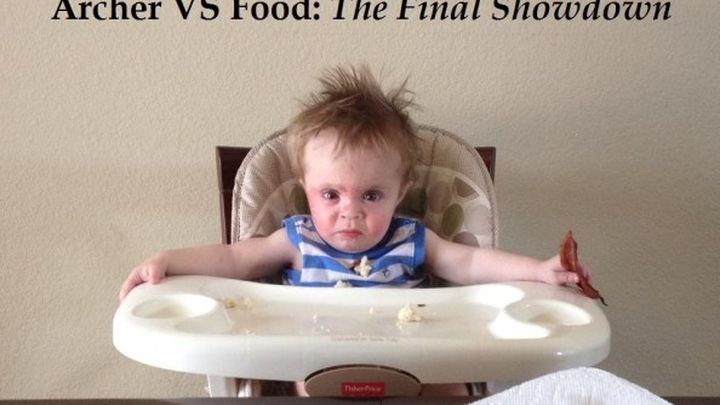
Help Archer Learn to Eat
Archer's Story
God, and our son Archer, don't care about trifling things like 'odds'.
We were told many things during my wife's pregnancy. In no particular order: Your baby has dwarfism. His heart is too big. His chest is too small. There isn't enough amniotic fluid. He has a club-foot. We can't hear a heartbeat. We can hear a heartbeat, but we need to check it twice a week for the next 3 months. Your baby will die in utero.
Archer was born December 14th, 2012. He wasn't breathing.
He came into this world looking a bit swollen, but he looked normal. No dwarfism, clubfoot or heart issues, but he wasn't breathing. The team of six from the Neonatal ICU administered CPAP to him there in the room, and rushed him up to the NICU. His mother did not get to see him first. Once in the NICU, a team of 12 went to work on him. 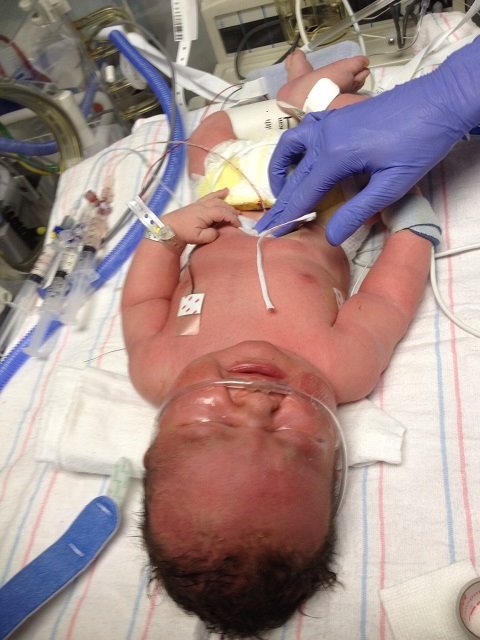
The doctor informed us that he had pulmonary hypoplasia, or underdeveloped lungs. His case was particularly bad. On an x-ray taken within the first 30 minutes of life, his lungs showed that they had holes in them from the pressure of his first breaths. They were also extremely underdeveloped. As she kept talking, we realized that she was preparing us for him not to make it. All they can provide in these situations is support care. There were no operations or medicines that would help him. It is up to his body and our Father whether or not his lungs would develop enough. We would later find out that with the severity of his condition, he had about a 10% chance to live. Remember what we said about God, Archer and odds? An x-ray taken 30 minutes after the first set showed an unbelievable and unexplainable improvement. The holes were nearly closed, and more lung tissue seemed to have appeared from nowhere. He wasn't close to being better, but his lungs were remarkably and miraculously improved. The next few weeks were difficult, and we had more than our share of scares, but six weeks later he was off of all oxygen support and breathing normally.
It is not lost on us that all of the diagnosis that he recieved in utero probably saved his life. We will never know if those things were actually present and were healed, or if they were just put into the doctors minds. Those incorrect diagnosis were the reason a team was in the room when he was born, and the reason we delivered at a hospital with a NICU. If those things had not been there at his birth, Archer would have died or suffered brain damage as a result of not being put on oxygen support right away. we are thankful for that.
The NICU is a terrible environment for babies to develop in. As much as you try, they do not get normal interaction or a normal introduction to life. In Archer's case, he was not allowed to attempt to eat until his lungs had improved. Once he was allowed to try, it was difficult for him. It is hard to manage eating and breathing at the same time when you just learned how to breathe on your own, and have never eaten before. 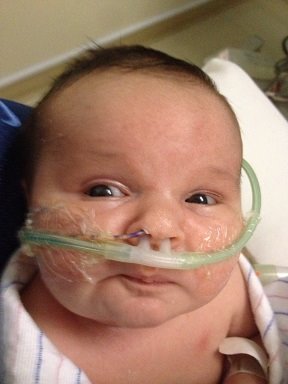
He developed what is known as an oral aversion to the bottle, and he also developed GERD. As a result of these things, Archer had a gastric feeding tube put in. The feeding tube alters the shape of the stomach and this actually increased his GERD symptoms drastically. The doctors were satisfied that he was getting calories in.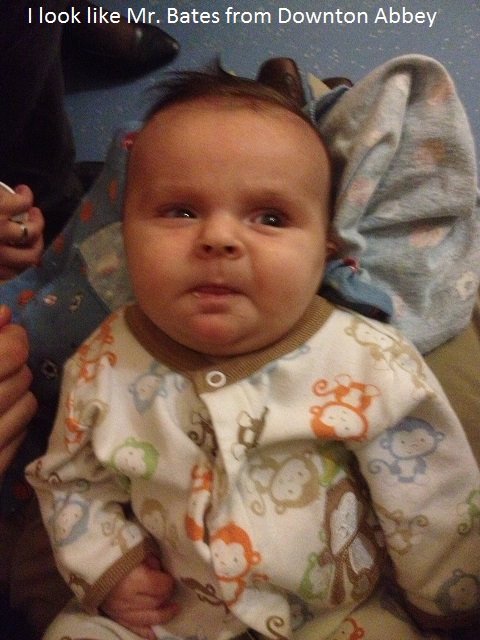
After 70 days in the NICU, Archer came home. 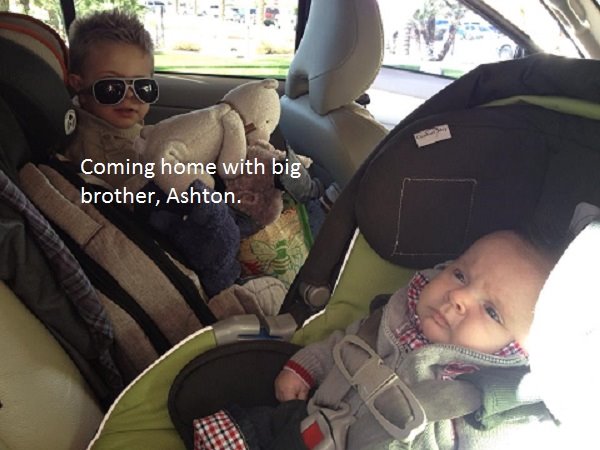
While we didn't go home with big concerns about his lungs, we did bring his debilitating case of GERD with us. It was horrible, for him and us. We had to feed him via pump on a constant basis. He would reflux over and over. So much of his food was coming back out that he wasn't gaining good weight. In August of 2013, we decided that he needed to eat, and the tube had to go, as it so badly exacerbated his symptoms. But how? He would gag and go into a dry-heaving fit if a bottle came within 6 inches of his face. We did endless amounts of research online. Most U.S. tube weaning is child-led. This means you keep introducing it to the child until they decide to eat. This was impossible with Archer because of his aversion. We eventually found some great resources in a blog written by a mom who had a similar situation and did a hunger based wean, Crunchy and the Smooth. The hunger method, known as the Graz Method, was developed in Graz, Austria. It was clear to us that the only way to get him to eat was to activate his hunger instinct. We performed our own week long wean based upon the feeding reduction schedule used by the mom on the blog mentioned, and we DID get him over his bottle aversion. It was terrifying to increasingly deny our child food, not knowing if we would see a result. After the week long wean, he would finally take a bottle, which was a miracle considering where we started. Yet it was not nearly enough to get him off the tube. His GERD continued unabated. In December of 2013 he had a particularly bad episode and he aspirated. The doctors had feared this ever since the NICU. For a baby with Archer's lung history, GERD is extremely troublesome because he doesn't have any reserves if he aspirates. He developed an extreme case of aspirational pneumonia and went into the hospital late one evening. It was 3 hours before we got him up to the PICU, and by that time, he was crashing. A doctor came in and told us that with a case this severe, he had a 50% chance of survival. We were devestated. We had been through everything else only to end up here? We cried and prayed together. We shouldn't have worried. 50/50? He had beaten worse. After 3 days on an oscilator he showed drastic improvements. A week later we brought him home.
It is now almost a year after his first wean. Archer has gone through periods where he won't drink much, and others where he drinks a lot. The GERD is always there. He will wake up in the mornings some days and have a dry heaving GERD episode. Some days he will drink 24 oz. and spit up over half of it in a series of gags and wretches. His GERD is supposed to improve drastically as he gets to eating solid foods (this will also drastically reduce the chances for aspiration). If he does eat solid foods, we will also most likely be able to get his tube out which should help his GERD. He will not eat solid foods. He will sit and eat with us and chew and taste, but he spits back out every bite. He gags on anything that hits the back of his throat. He has developed an aversion to swallowing anything that isn’t liquid. He is scared to eat because of all he has been through.
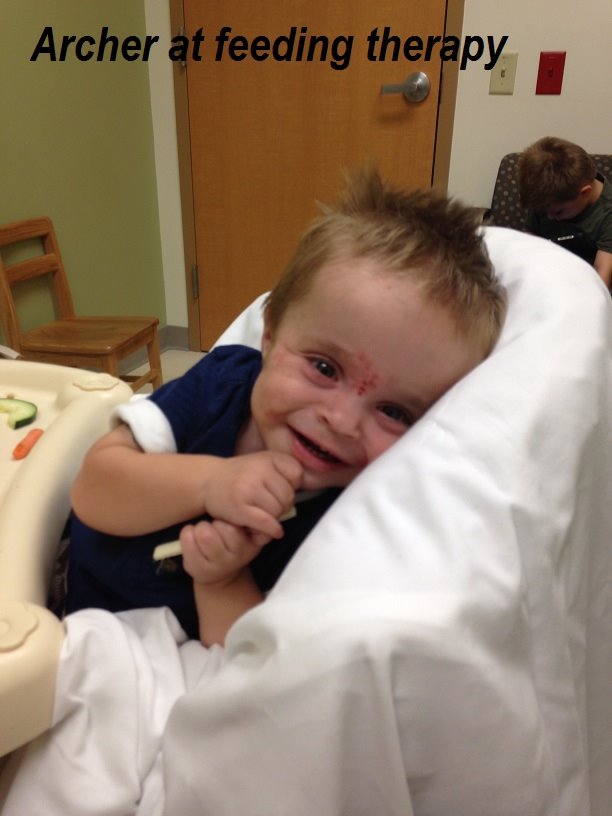
He currently goes through traditional style feeding therapy every other week, but we have seen no gains. They acknowledge that he isn't their traditional case. Unlike many kids with tubes, he really loves playing with and tasting food. He just will not allow himself to swallow it. They are telling us that it could potentially be years before he is off the tube. To the doctors and feeding therapists here, that is acceptable. It's not acceptable to us. His problem is not one that is going to be solved by just continuing to try to introduce food to him in new ways, which is their predominant method. This is the issue: they ackowledge that he is different than most kids they treat, and then they don't recommend a different treatment. It is SO frustrating. We have done extensive research into hunger based feeding therapies, and have mentioned it all to them. It falls on deaf ears. Their method is what they have always done, so it is all they will do. Their whole process is led by what the child decides to allow. The problem is that Archer doesn't see a need to eat, so why would he? 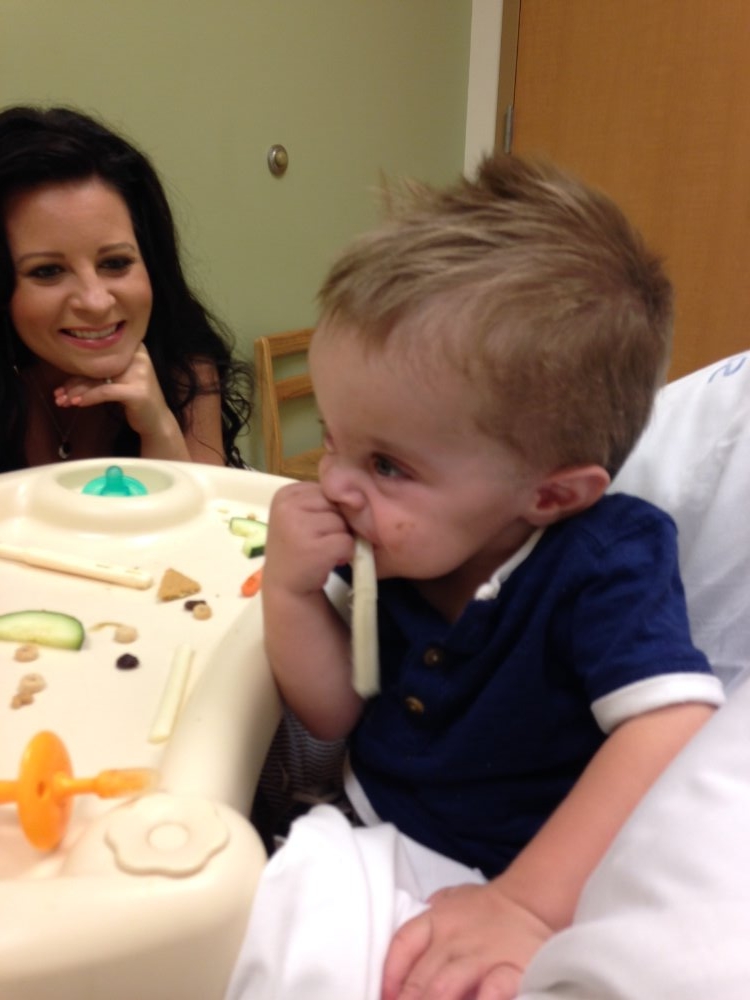
Food has never really felt good to eat or had to satiate hunger, so why do something that hurts or is scary? We know what we need to do. We know what worked with his bottle aversion. He needs to feel hunger to want to overcome his gag reflex and do more than just taste food. We want to do a full hunger based wean with him, utilizing the resources at Graz to guide us along the way. They have a service called netcoaching, where they do full evaluations over Skype, and guide you through the hunger wean. The Graz Method is the only way forward that we see, but to do it properly and see it through all the way we need help. They are the experts. They are medical professionals who have seen it all before. We have read their clinical studies. Their average wean takes about 3 weeks, after which the child is completely tube weaned. They know when to push and when to back off. We would be guessing if we did it alone. Their success rate is 90%. Remember what I said about odds? You are going to give this kid a 90% success rate to work with? Come on now. That’s toddlers play.
We cannot afford to do this on our own. We have ongoing medical costs around his tube usage and regular follow up appointments with doctors. We have physical therapy twice a week to try to help him make up milestones that he has missed. We need help to afford the $6,000 cost for the net-coaching program through Graz. It’s not easy to ask, but it’s the best way forward we see for our son. Thanks for reading his story.


